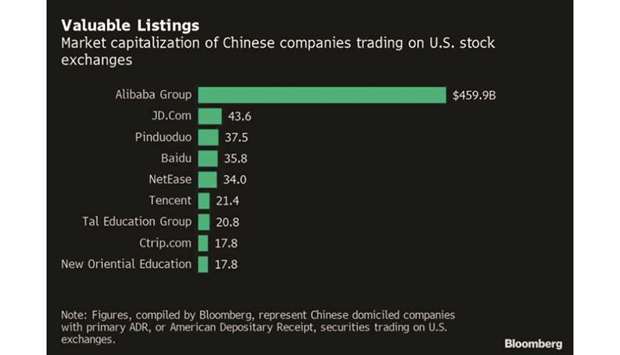A US Treasury official said there are no current plans to stop Chinese companies from listing on US exchanges, a day after a report that the Trump administration is discussing ways to limit US investors’ portfolio flows into China.
“The administration is not contemplating blocking Chinese companies from listing shares on US stock exchanges at this time,” Treasury spokeswoman Monica Crowley said in an e-mailed statement on Saturday.
Crowley was responding to Friday’s Bloomberg News report on various measures under consideration by the US, including delisting Chinese companies from US exchanges. The report unnerved markets, with the S&P 500 Index closing about 0.5% lower. US-listed shares of China-based companies, such as Alibaba Group Holding and Baidu Inc, tumbled.
Other potential measures include limiting Americans’ exposure to the Chinese market through government pension funds, and ways to put caps on the Chinese companies included in stock indexes managed by US firms, according to people familiar with and involved in the discussions. Crowley’s statement didn’t address or rule out any of those possibilities.
Inter-Agency Meetings Administration officials for weeks have been examining their options, and Treasury has been participating in inter-agency meetings chaired by Larry Kudlow, the National Economic Council director, the people said.
Still, the push largely comes from Trump’s more hawkish aides, like White House trade adviser Peter Navarro, and outside advisers like Steve Bannon. The NEC and Treasury are wary of the market reaction and are working to ensure that any plan would be executed in a way that doesn’t spook investors, the people added.
People close to the administration on Friday expressed annoyance at the discussions being publicised, contending that the White House hasn’t decided on a course of action. They said the discussions were examining a wide range of options and were therefore not yet ready for public consumption.
Some advocates of a crackdown on financial flows within the administration said they saw the fact the discussions were being leaked as an effort by doves inside the White House to kill the effort by stirring up opposition.
While various Chinese media republished the Bloomberg report and the Treasury Department’s statement, they were not immediately seen responding to the deliberations by the Trump administration. The Commerce Ministry didn’t address the issue at a press conference yesterday.
President Donald Trump has given the green light for the review, a person familiar with the deliberations said, but exact mechanisms or a timeline had not been worked out.
More dovish advisers involved in the discussions frame any action as necessary to create a level of reciprocity.
The administration’s hawks argue that any US investment in Chinese companies, whether they’re listed in the US or China, exposes investors to potential fraud as a result of poor Chinese corporate governance standards.
Some even say that the close relationship between the ruling Chinese Communist Party and many listed companies, whether formal or informal, means that any investment in them amounts to support for the party and even the People’s Liberation Army. In their eyes, US investors are effectively underwriting Washington’s biggest economic and strategic rival.
Hawks like Navarro have in the past publicly accused Wall Street of seeking to undermine Trump’s efforts to rein in China’s economy.
A bipartisan group of lawmakers – notably Senator Marco Rubio, a Florida Republican – have pushed for stronger investment restraints and greater scrutiny for Chinese companies in stock indexes and US pension funds.
The White House has been in touch with Rubio to discuss the matter and could potentially support legislation he’s put forward that would set up a process to delist Chinese companies from US exchanges for continued failure to comply with US laws.

